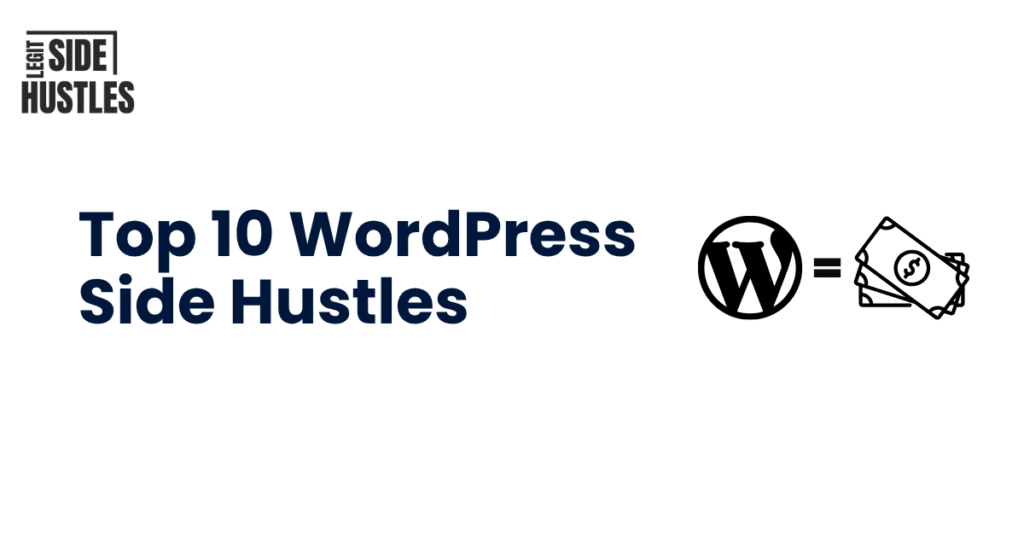I may get a paid commission for purchases made after clicking an affiliate link in this post.
WordPress side hustles are awesome because they’re beginner-friendly, scalable, high-demand, and have low startup costs.
You only need 2 things to start earning money with WordPress:
- Foundational experience with WordPress
- A high-quality hosting platform, like Hostinger
Simple, right? Aside from that, you’ll need a desire to learn and the ability to serve customers well.
Now let’s look at the side hustles.
Table of Contents
1. Local business website design
You’ll create simple, branded, user-friendly websites for local businesses using WordPress.
Remember, most small business owners don’t have the time or the tech skills to build a WordPress website, but most of them realize they need a professional website.
How to start
Offer simple one-page websites for $500 to $1,500. Sell them to local service-based businesses in niches like landscaping, plumbing, and wellness.
2. WordPress maintenance plans
With a maintenance plan, you’ll provide ongoing monthly support such as updates, backups, security, and domain or hosting management.
This is a fantastic side hustle because it provides recurring revenue through a service that WordPress website owners need, but most likely don’t want to deal with themselves.
How to start
You can use a tool like ManageWP to automate maintenance tasks, then create a maintenance bundle called a “care plan” and sell it to clients.
3. Blogging
You can’t have a list of WordPress side hustles without talking about blogging. Build a blog with WordPress, drive traffic to the blog, and earn money with:
- affiliate links
- ads
- digital products
- online services like consulting
Blogging has low startup costs and a small learning curve, along with many opportunities to scale your blogging income. Plus, there are many potential niches.
How to start
Sign up for a Hostinger account, install WordPress, set up the Astra Theme with Starter Templates, and follow blogging tutorials on YouTube. You’ll also want to learn some traffic strategies, like organic SEO and Pinterest.
4. E-Commerce store setup
Using WordPress, you can easily build online stores for product-based businesses using Surecart or WooCommerce.
WordPress is an exceptional e-commerce platform because you don’t have to deal with the fees and complexities associated with e-commerce website builders or marketplaces. Plus, it gives you much more control over your online store.
How to start
The best way to get started is by charging per product page. Don’t forget that this includes photo uploads, SEO settings, and category/collection setup.
5. WordPress SEO services
Offering SEO as a service means you’ll help WordPress users rank higher in search results with keyword research, on-page SEO, backlink building, and local SEO.
SEO will always be in demand as long as search engines exist, especially for local business owners, coaches, and bloggers.
How to start
You can learn SEO basics from YouTube or Udemy courses. Then, you can offer website audits or foundational SEO packages on LinkedIn, Facebook groups, or local networking events.
6. Speed optimization services
Help WordPress users improve their website load times and user experience by optimizing their websites for better speed and performance.
Everyone needs a faster website, especially businesses that want to improve their search engine rankings and reduce bounce rates.
How to start
You can offer customers GTmetrix reports, image compression, caching setup, and CDN implementation using plugins like LiteSpeed Cache, Nitropack, or WP Rocket.
7. WordPress troubleshooting and fixes
Lots of WordPress website owners need help with one-off fixes for broken plugins, mobile issues, or security problems.
Understandably, users panic when something on their website breaks, and they’ll gladly pay someone who can fix it fast.
How to start
You can productize your services and list them on Fiverr, your website, or find clients on Upwork. In the long run, SEO and referrals will also work well for this side hustle.
8. Create and sell WordPress templates
It’s pretty easy to design templates for Elementor or other WordPress resources, then offer them as template kits for people to install.
Website owners love pre-built templates because they want to buy back their time, and templates give them a plug-and-play system.
How to start
Figure out your WordPress template niche, then list them on Creative Market, Etsy, Gumroad, or your website. Check out Darrel Wilson’s Elementor templates for inspiration.
9. White label WordPress services
When you white label, you fulfill a service for marketing agencies or freelancers under their brand name.
A lot of agencies want to sell websites and other WordPress services, but don’t know how to offer them. White labelling means you’ll provide the services, and they’ll provide the clients.
How to start
Figure out the best services you can offer, then network with other agencies on LinkedIn, Facebook, locally, or with cold outreach.
Alternatively, if you’re good at finding customers, you can hire white label partners yourself to fulfill client services.
10. Create WordPress tutorial content
If you’re a WordPress fanatic, you can teach people how to use WordPress with videos, blog posts, courses, or a membership.
WordPress powers over 40% of the web, and new users are always looking for help.
How to start
Pick a WordPress niche or category you want to talk about. Then you can record YouTube tutorials, create a Skillshare class, or publish blog posts with affiliate links and WordPress training services.
Final tips
Now that you know about 10 different WordPress side hustles, pick one and commit to it for just 30 days. Think of it like a small experiment.
Pick one that aligns with your income goals and existing skills. And remember, you can always learn things about WordPress for free using platforms like YouTube, Google, and podcasts like the Legit Side Hustles Podcast.

